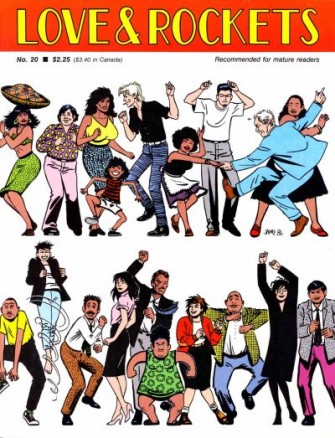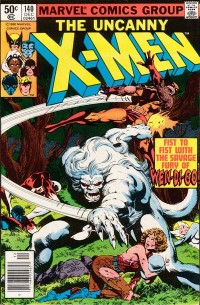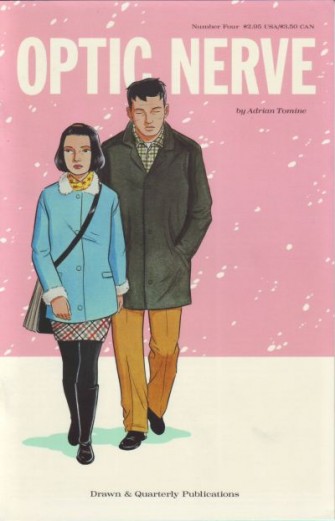
March 22, 2010
 Go, Read: Brian Hibbs On The Failures Of The Current Comics Periodicals Market
Go, Read: Brian Hibbs On The Failures Of The Current Comics Periodicals Market


I've been writing about the idea of periodical comic books as habitual entertainment since 1995, and I think anyone who has ever been in the habit of buying comics that way would agree to me that reliable, weekly nature of the experience is a significant factor for the way they buy or the way they're aware other people buy. Maybe both. My personal experience has always been that many weekly, Direct Market comics-shoppers have a split impulse that fuels what they take home: they buy and follow certain comics or characters or creators, but they also facilitate for themselves a comics-reading experience that in many cases involves matching a rough or even set amount of money. Usually the two overlap.
To state this another way: while I admit content-only comics buying could be the case with some people, literally none of the comics shoppers I've known in Indiana, Virginia, Pennsylvania, Chicago, Seattle and New Mexico employed a rigid, content-driven buying strategy that would have them comfortably buying one comic one week and eleven the next week. If a week was stuffed with comics they liked my friends and acquaintances
might buy them all but they also might just buy the ones they really, really liked. If the week was light on comics they enjoyed, they might try something new, settle for something they sort of liked but was reliably there, or buy books they passed on from a previous stuffed week.

It's anecdotal evidence, sure, but it's twenty years since I started paying some attention to it. There's a ton of factors I don't understand at all that also come to bear: I don't know or understand premium cover collectors, for instance. Like as human beings I don't understand them. I don't know any "I will buy every issue of X-Men even when it hurts" customers, mostly because I stopped buying comics in comics shops before the publishers turned this into a real pressure point, transforming a custom into a dare. I also have to imagine that everything is different for the folks spending $200-$400 a week in regular fashion. Hell, the insides of their cars probably smell different. But to deny any effect to this very specific and peculiar way certain comic books are sold in North America seems to me the kind of thing you can only do in some goofy Internet argument you refuse to lose.
Brian Hibbs
touches on this issue and a few more in this recent CBR piece; I think it's a good one to read if you want to understand the modern comics periodicals market from someone on the front lines.

His solutions are all reasonably compelling. I endorse his general logic that if you want to serve a certain kind of customer, you should do your best not to trip over your own feet while serving them, or, you know, directly antagonize them. At least one of Brian's solutions involve a closer reading of comics than I'd be comfortable putting forward. I have no idea if people are favoring one kind of storytelling experience over another, if Armless Speedy (didn't read) is more popular than Brainless Iron Man (read and enjoyed) or what, but I would generally leave that part in the publisher's hands (and in fact, a more systemic problem may be that there's almost no penalty for creating work that's fallen out of favor). Where I might break with Brian is that nearly all of his solutions are about making the current set-up work more effectively, and that runs the risk of keeping the system sort-of broken, or at least skewed. I would suggest to Brian that many of the things for which he advocates more generally, or for which others have long advocated, might also have an effect on better serving the current audience. Here's a few that occur to me on a Monday morning.
1) More stores. Brian uses a drug metaphor to describe the haphazard week-to-week scheduling of the mainstream comics companies being akin to cutting the product with way too much baby powder. I'm more of a Barksdale: I think having more corners would be a good thing, too. I think this might be true even in changing behavior at the existing points of sale. The one thing that we know from the numbers is that more accounts selling comics means more comics sold, even when many of the accounts are crappy. The mainstream comic book industry has potentially pissed away most of a big opportunity to restore its coverage map in an economy that actually favors the pursuit of franchising and small-business opportunities. With a bunch more stores, there's a chance -- a very small chance, but a chance -- that the publishers with a goal of selling two copies of a Wolverine comic will reorient themselves from selling customer A copies of two different comics and selling the same comic to customers A and B. Although it's not something anyone wants to talk about I think that the price point of digital initiatives and a potential greater attention to expenditures that may come from increased corporate attention could be a factor in this, too.
2) Break the back issues market. I think a big chunk of the back-issues market is made-up, exploitative bullshit that leads to a lot of dead pulp lying around. I suspect many stores would be better off in a culture where we treated the vast bulk of used comic books as used books with a higher grind and turnover than as a dubious, strongly asserted commodity they may or may not be able to cash in on at some point. If you want people in the habit of coming into the shops, creatively giving them a reason to show up that has nothing to do with the capriciousness of new comics, that works for a lot more comics fans than I think people imagine. It can also help your entry-point problem. If DVD rental companies worked like comics shops, Netflix would charge $16 to rent
Dutch.
3) Incentivize Non-Mainstream Periodicals. I'm no longer a comic shop customer. I was a
really good comic shop customer. I came in every week, I spent a significant amount of my discretionary income at these shops. I tried new comics suggested to me by my retailers. I recommended my shops to people. Today, there's almost no periodical work I'm interested in buying that actually appears in comic shops, even when I have months of pent-up demand working in my favor. Were it not for homework and friends, I'd spend less on periodical comics now than I spent in two weeks back in 1991, when comics were much cheaper.
Rather than boiling off layers and layers of comics fans over the years, why not try and restore a reason for those who love them to get back in the exciting habit of buying these comics again? Why wouldn't you want these customers, too? I'm of the mind that as much as the Direct Market did to drive those comics right out of existence, the Direct Market could also work to restore them if it wanted. You could directly target such publications with discounts, although other market agents would likely set their hair on fire and run through the streets if this were done. But even modest programs that, say, excused all publishers with ten-years of standing in the market the freedom to do comic books without being held to Diamond sales minimums until some traction were gained, or a program by which the releases from certain publishers were coordinated so as not to dump them all at once but encourage weekly visits from that kind of customer, these would be easy to do and might help. I would assume that there are better solutions than what I can come up with at 7:20 AM on a Monday morning. But whatever gets tried, it would have to be better than doing nothing.
 posted 8:00 am PST
posted 8:00 am PST |
Permalink
Daily Blog Archives
November 2019
October 2019
September 2019
August 2019
July 2019
Full Archives


